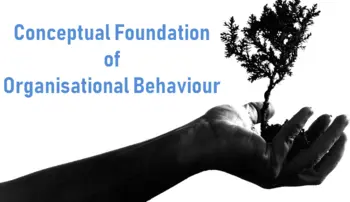Conceptual Foundation of Organisational Behaviour – OB
The foundation of organisational behaviour refers to the fundamental principles and concepts that form the basis for understanding human behaviour within an organization. It encompasses various factors that influence how individuals and groups behave, interact, and perform in the workplace. Understanding the foundation of organisational behaviour is important for managers to manage and lead their teams effectively. It enhances employee motivation and productivity and creates a positive work environment.
Some key aspects of the foundation of organizational behaviour include motivation, communication, leadership, decision making, group dynamics, and organisational culture. By understanding these foundational elements, organizations can develop strategies to optimize performance and achieve their business goals.
The fundamental concept of organisational behaviour is based on a few organisational behaviour concepts which revolve around the nature of individuals and organizations.
The organisation’s behaviour role is not only concerned with a particular organisation. Organizational behaviour concepts and approaches are concerned with society.
Organisational behaviour begins with a specific set of basic terms that form a strong base for organizational behaviour.
Related Article: Transactional Analysis in Organisational Behaviour

The fundamental understanding of both human nature and the nature of the organization builds the foundation of organisational behaviour.
The fundamental concept of organisational behaviour and the conceptual foundation of organisational behaviour are as follows:
There are two basic concepts of organisational behaviour, such as
1. The nature of people
2. The nature of an organization
Related Article: Challenges and Opportunities of Organisational Behaviour
1) Nature of the People
There are many fundamental concepts of organizational behaviour related to people. Some of the fundamentals of organisational behaviour are as follows:
i) Individual Differences
Management can motivate the employees of an organization in a better way by understanding that all individuals are different from each other and, hence, treating every person differently. The Law of individual differences also teaches us that each individual is unique and different.
Related Article:- Factors Affecting Recruitment
ii) Perception
Every person has their viewpoint regarding different objects and people. Therefore, individuals perceive things in varying ways, i.e., individuals may perceive the same object differently. These differing viewpoints about the objects in an environment can be made clear through accurate perception.
iii) Motivation to Employees
When an organization needs an employee, it fosters a sense of belonging and motivation in the employee to perform well within the organization. Sometimes, motivation is also necessary to pursue excellence or improve work quality.
iv) Whole Person
While hiring an employee, the manager also hires various things associated with an employee, like his nature, likes, dislikes, perception, behaviour, preferences, background, hobbies, etc. However, his personal life cannot be isolated from his professional life. Hence, a manager should make the workplace comfortable for him, like a home, so the employee can feel comfortable working at home.
V) Caused Behaviour
Psychology teaches us that normal behaviour has issues related to a person’s needs or due to specific actions. The management can motivate employees in two different ways. Firstly, it shows them how their actions can fulfil their needs. Secondly, threatening them with undesirable actions can negatively affect fulfilling their needs.
vi) The desire for Involvement
Employees who purposefully involve themselves in an organisation’s workings feel good about themselves. Management should provide such opportunities to employees, resulting in the mutual growth of the employees and the organisation.
vii) Human Dignity
Everyone in their workplace wants to receive respect, dignity, and recognition. Respecting the human dignity of an employee means recognizing his presence and relating to him in a way that may enhance his being. Managers should treat employees in the workplace with respect, mirroring the treatment they expect for themselves.
Related article: Importance of Organisational Behaviour
2) Nature of Organisations
Individual differences, a whole person, caused behaviour and human dignity are practised like people and social systems, mutuality of interests, and holistic concepts are applied like the organization.
There are some fundamental concepts of organizational behaviour concerning the organization are mentioned below:
i) Organisation is a Social System
A social system is an orderly arrangement of interrelated components, and every part has a fixed role to play. Similarly, an organization’s employees, workers, and managers have definite roles, and they all are connected; therefore, they are all connected directly or indirectly to each other. An organization coordinates the activities of its employees to achieve its goals.
ii) Mutuality of Interest
The relationship between an employee and the organization is complementary to each other. The organization’s goals can only be achieved through the efforts of an employee and the management, which results in mutual growth and development for both the employee and the organization.
iii) Ethics
Business ethics involves specific guidelines and principles that govern how an individual should behave in an organization. Ethical conduct is essential for an organization to obtain and hold valuable employees in this competitive environment. Organizations must create an ethical environment for the employees and people directly or indirectly connected to the organization. This may improve the goodwill and trust towards the organization.
You May Also Like:-
Nature of Organisational Behaviour
Contributing Disciplines to organisational behaviour
Models of Organisational Behaviour
Approaches of Organisational Behaviour
Emotional Intelligence in Organisational behaviour
Factors Influencing Perception
Scope of Organisational Behaviour
Importance of Organisational Behaviour
Challenges and Opportunities of Organisational Behaviour
Factors affecting group behaviour
Causes of Conflict in an Organisation
Types of Conflict in an Organisation
Organisational Development Process
Factors Affecting Organisational Culture
Trait Theory: Stogdill’s trait factors
